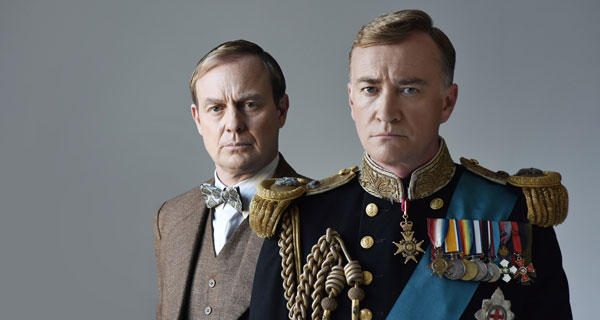@ King’s Theatre, Edinburgh, until Sat 23 May 2015
David Seidler’s The King’s Speech is a play that came to the public eye through the 2010 Oscar-winning movie. It tells the story of King George VI’s stutter. When you consider Prince Andrew’s alleged recent dodgy business dealings and the Prince of Wales’s meddlesome ‘black spider’ letters, royal scandals have certainly changed.
As World War Two approached, the king – the present queen’s father – became a focal point (and valuable propaganda tool) for the war effort. His advisers and the politicians knew that reassuring speeches on the radio to global millions would do wonders for morale, but not if he couldn’t overcome his speech impediment. Radio was in danger of stripping away the mystique of monarchy (just as TV and the paparazzi were to do decades later) in a modern age where the Royal Family seemed increasingly out of step.
The king, or Bertie has he was called, played here with nervy hauteur by Raymond Coulthard, and his wife – later the Queen Mother – (Claire Lams positively oozing fragrant fortitude) seek help from Australian speech therapist and thwarted actor Lionel Logue (a non-singing Jason Donovan, who captures well the back-slapping abrasiveness of the Aussie who treats the king as an ordinary bloke not a deity). This was a time when men didn’t ‘ask for help’, least of all the King of England whose Empire stretched across world and was still believed by many to have been appointed by God.
Bertie gained a role in history he never wanted by virtue of the Abdication Crisis. He brought with him psychological baggage (he was a mediocre man, a bottom-of-the-class character) and the play shows his victory over a tormented childhood of bullying and distant parents. Coulthard hints at the decent and dutiful king in the making, although sometimes his Bertie comes over as merely hesitant rather than someone struggling with a debilitating stammer, but somehow there’s a lack of energy.
The stylish set (Tom Piper) evokes a 1930s BBC studio as much as the deco elegance of Eltham Palace and dramatic noir shadows from lighting designer Oliver Fenwick create a sense of the weight of history bearing down on all concerned. Roxana Silbert’s direction is economical, telling a complex story well. She easily balances elements historical and all too human, although the plot never quite catches light.
If the premise of the play seems slight, it should be remembered, despite recent jingoistic VE Day celebrations, just how close Britain came to losing the war. Moreover, curing the confidence-sapping stutter is but a trope that allows the play to reveal the ‘real people’ behind the royal personages, as well as the inextricable links between politics and the throne that are so often denied or hidden. It’s also the story of the triumph of personal endeavour of one man (even if he was born with a silver spoon in his mouth, no pun intended).
